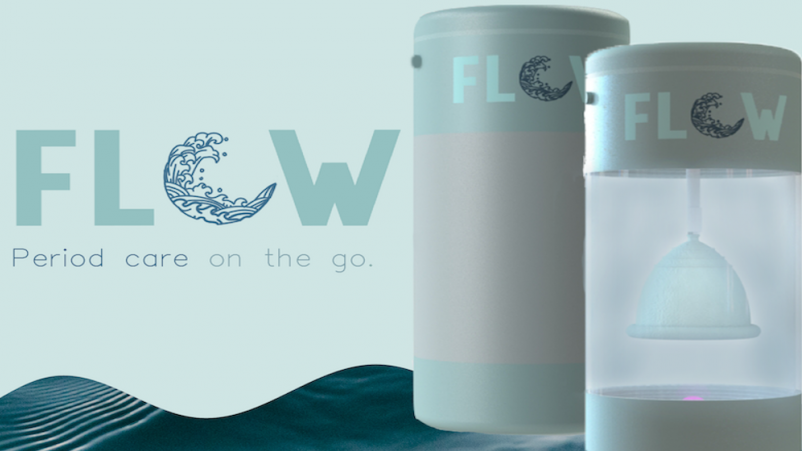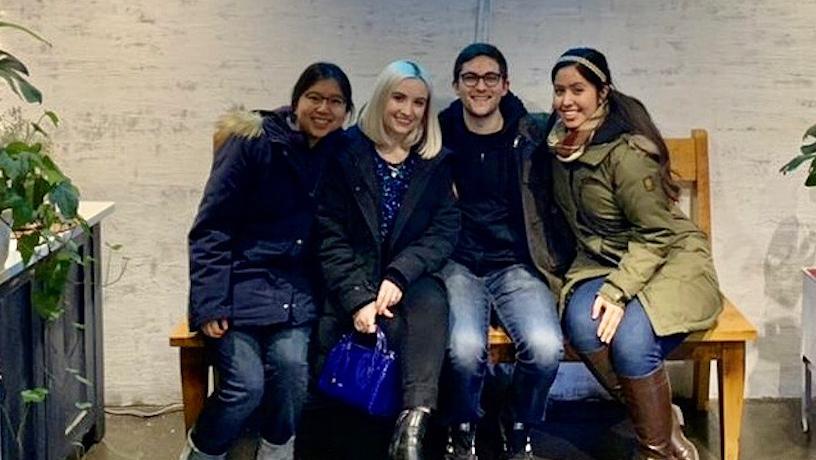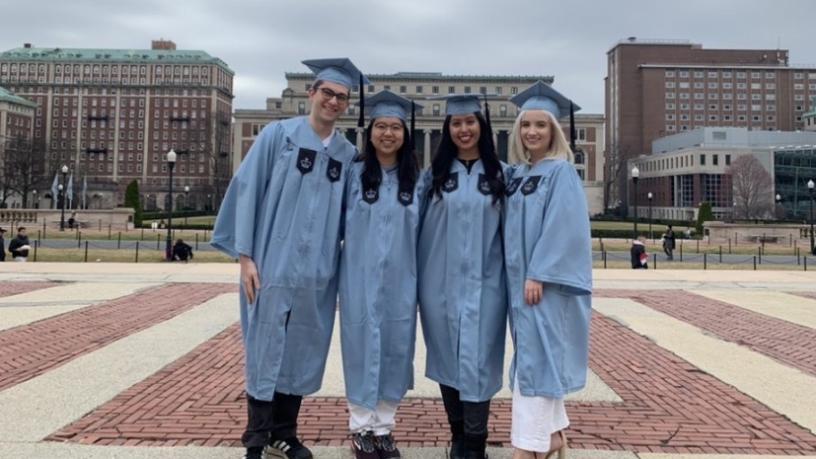Bringing Engineering and Design Solutions to Women’s Health and Sustainability with the FLOW
A team of Columbia students from the Department of Mechanical Engineering (Daniela Durón García, Taya Pauline Voronko and Andrew William Parda) hope to revolutionize period care with the FLOW, a novel cleaning device for menstrual cups born in their Senior Capstone Design class. The students, including senior Angela Chung, propelled the FLOW over the course of the 2019-2020 academic year in spite of challenges brought on by the COVID-19 pandemic. After remotely working on active ideation, consumer research, computer animated prototyping, and functional embodiment testing, the students are now creating a prototype to test the FLOW in the marketplace.
The Vision
“Our team was majority women, so when we brainstormed for a product idea we naturally went to some of the problems we face as women and how we could frame them as engineering design challenges,” reflects Daniela Durón García, who received the Department of Mechanical Engineering Senior Design Award. “As young adults coming to terms with the impending climate crisis, we recognized that modern menstrual period care in the form of single-use products is greatly contributing to waste. Menstrual cups naturally lie at the intersection of the needs of menstruators and of the planet, offering significant financial and environmental savings compared to single-use options.”
After studying the barriers to menstrual cup use, which include perceived messiness and concerns around introducing pathogens to the body, the team needed to address portable and discreet cleaning and sanitizing of the menstrual cup to functionalize its everyday use. The FLOW is designed to address these needs and to build more environmentally and financially sustainable habits without sacrificing hygiene.
The first of its kind, the FLOW combines rotational energy and UV light to clean and sanitize any menstrual cup. The menstrual cup attaches to a clip inside a water bottle-esque design that is portable and discrete. The user fills the vessel with water, gives it a spin, and empties it out before turning on the UV light, which sanitizes the cup.
“We want to ensure that the FLOW is an affordable product with a long lifetime that pairs naturally with the 10-year lifespan of a menstrual cup,” says team member Andrew William Parda. “We are carefully considering which materials will be best suited for the needs of our product, focusing on materials that are UV-resistant, waterproof, durable, and non-leaching.”
The Engineering Challenge
“One of the foremost challenges of the FLOW housing is to maintain a water-tight design so that users can comfortably use and stow their FLOW without worrying about leaks or spills,” continues Daniela. “To enable the everyday use of our product, we are prioritizing a compact or foldable design that would empower users to bring their FLOW wherever they go. Another challenge has been designing a simple rotating cleaning mechanism that will be durable and easy to use as well as manufacture.”
“Midway through Senior Design, Professor Harry West introduced us to the human-centered design philosophy, which emphasizes user input as the guiding principle in the problem-solving process,” adds Taya Pauline Voronko. “Thanks to this, we were able to sit down with menstruators, both menstrual cup users and non-users, and develop an understanding of a product that would best serve them.”
“We are still in the process of prototyping and iterating the design of the FLOW, so we are still able to make significant changes pending user feedback,” says Andrew. “While the vision for the product is clear, we continue to research the physical manifestations of cleaning and sanitizing and we are testing for effectiveness and ease of use.”
Going with the FLOW Through the COVID-19 Pandemic
As a result of the COVID-19 pandemic, the team’s time and access to on-campus resources was cut short without warning, which resulted in losing over two months of access to tools, machinery, materials and funding.
“When COVID happened we knew we couldn’t expect students to build their projects, so we pivoted to a business plan as the primary deliverable, which was not part of the original curriculum,” says Josh Browne, professor of the senior capstone class.
Despite newfound challenges with remote work and lack of machine shop access, the work on the FLOW never stopped. Since leaving campus, the team pressed forward with design software ideation, rendering a variety of embodiments for the physical mechanisms of the FLOW such as cleaning, sanitizing, and power solutions. These embodiments have been used to populate and file a provisional patent application, which has given the team a year to finalize the design and raise money to support a full patent application.
“While we were no longer able to progress the physical design with testing, we were able to meet remotely to continue the work of considering different embodiments that would be worth testing,” says Andrew. “This effort proved fruitful for the provisional patent application that we submitted after graduation.”
“The most challenging aspect of continuing this project has been working together while located across three different states,” says Daniela. “This was especially frustrating when we’re really on a roll and making great progress, but we’ve learned to manage this inconvenience by setting clear goals and using our communication tools wisely.”
“Shifting all of our communication online and developing new ways of working has been challenging,” adds Taya. “We used to meet in the Mechanical Engineering lab every day, but now all our meetings are on Zoom! What keeps me going through this difficult period are my teammates, the continued support from our professors and the department, and a strong belief in our product’s potential.”
Unexpected Opportunities: A Business Plan and a Provisional Patent
“Early on, before COVID, these students were inquiring about taking the idea forward and how to protect their idea before they shared it,” says Yevgeniy Yesilevskiy, Lecturer in Discipline in the Department of Mechanical Engineering. “Once we went to remote learning, this team was one of the most active teams on the business plan side. A lot of what we did dove into hypothetical uncertain territory, and they definitely persevered through that struggle and came up with novel approaches.”
“Part of the benefit of the changes brought on by COVID was being able to explore our product from a commercial perspective in the form of a business plan,” says Andrew. “This allowed us to get a better understanding of the growing menstrual cup market in the US, build a value proposition for our product as compared to alternatives, and explore the avenues that could take us from an idea to a funded corporate enterprise.”
“By writing a business plan, we gained valuable knowledge about the menstrual cup market and insight on obstacles that need to be overcome in order to bring the FLOW to future consumers,” adds Daniela. “The market analysis we performed will be instrumental in seeking grant funding, venture capital funding, and small business loans that will allow us to manufacture our product once our prototype is finalized.”
The team has formed a company, FLOW Period LLC, and submitted a provisional patent application, which gives them a year to submit a full patent application with the finalized design of the FLOW.
“To bring the FLOW to market, we need a functioning prototype that can be shown to manufacturers and investors. In order to raise funds for prototyping we’ve launched an Indiegogo campaign and are applying to grants that best align with our product,” says Taya. “Once a prototype is complete, we’ll enter the next stage of fundraising, likely bringing our prototype to investors, entering design competitions, or securing a loan to manufacture and bring our solution to users.”
From Students to Professional Engineers: The Lasting Impact of the FLOW Project
All Class of 2020 graduates, Daniela, Taya and Andrew consider the FLOW project an invaluable experience that continues to influence their goals as they launch professional engineering careers.
“One day we are more technically focused, centering on design elements and considering embodiments to best achieve our goals,” says Andrew. “Another day we are focused on consumer feedback. The next day we are trying to maximize our exposure on social media and work on branding and messaging. The following day we focus on the legal side of FLOW Period, LLC and how its operations run with voting, rights, and revenues. This wide breadth of exposure is serving to make me a multifaceted candidate capable of not only performing high level engineering work, but also armed with battle-tested skills in communication, writing, marketing, and legal considerations that I think will put me in a position to be a strong leader wherever my career takes me.”
“When I came to Columbia, I never pictured myself as a business owner, but four years later, with the help of Senior Design, that’s exactly who I am,” says Taya. “The FLOW project has helped me recognize what I’m looking for in my career as an engineer and designer. As I continue to navigate the job market, I know that this project is pushing me to learn skills and adapt quickly, all of which I can apply to my future career.”
“Working as a part of the FLOW team has made it clear to me that I would like to work on innovative projects that improve the health of people around the world,” says Daniela. “It would be extremely fulfilling to know that my contributions as a professional engineer could increase accessibility to medical treatments, increase success rates associated with medical procedures, reduce recovery time, and most importantly, reduce the pain felt by patients. I am very proud to be a part of a team that is doing their part to address important health issues and can’t wait to see what the future holds for FLOW Period, LLC.”
To learn more about the FLOW team’s mission please visit the company website at https://www.flowperiodllc.com/ and keep up with their progress on Instagram @flowperiodllc. If you would like to help bring FLOW into the world please consider donating via Venmo, CashApp, or Paypal at https://www.flowperiodllc.com/donate.



